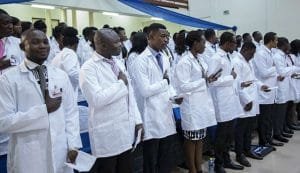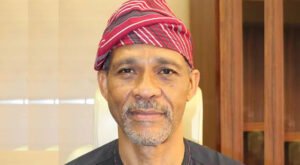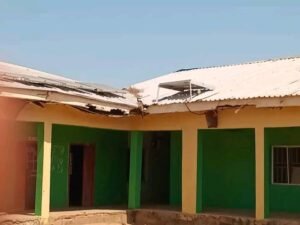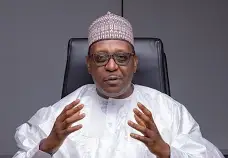Brain drain or JAPA syndrome continues to constitute a big challenge to the growth and progress of Nigeria’s healthcare sector.
With over 16,000 medical doctors kissing a final goodbye to Nigeria and settling down in Canada, US, UK or even Saudi Arabia in less than five years, do you need further proofs?
As thousands of qualified doctors and nurses, and medical science professionals seek better opportunities abroad, the Nigerian healthcare system is left reeling under the weight of what looks like the worst ever brain drain crisis. In this special report, Korede Abdullah, Africa Health Report’s South-West correspondent, tells the damning narratives of how a key sector is being watched to deteriorate, human capital waste, and recommends urgent actions to arrest the backwards steps.

Growing Crisis in Heath Sector
In a dimly lit hospital ward in northern Nigeria, rows of empty beds and frantic nurses paint a sobering picture. Meanwhile, across the ocean in bustling hospitals in London, New York, and Toronto, Nigerian doctors are among the most sought-after professionals.
This contrast underscores a growing crisis: the massive exodus of Nigerian healthcare workers. With over 16,000 doctors leaving Nigeria in the last five to seven years, the nation’s healthcare system is bleeding—and the consequences are dire.

Living on Past Glories
Once hailed as a hub of medical excellence, Nigeria’s premier institutions like the University College Hospital (UCH), Ibadan, and Ahmadu Bello University Teaching Hospital, Zaria, produced world-renowned doctors. According to Prof. James Olusanmi, a health historian, “Nigerian doctors used to be the gold standard in Africa and beyond.”
However, signs of decline began emerging in the early 2000s, exacerbated by inadequate government policies that failed to prioritize the health sector.
Triggers Brain Drain
Poor working conditions remain a leading cause. Dr. Tunde Afolayan, a Lagos-based surgeon, who spoke with Africa Health Report (AHR) lamented, “We often have to improvise for basic equipment. Sometimes, there’s no electricity to perform surgeries.” Security issues compound the problem: doctors are increasingly targets for kidnapping, especially in volatile regions.

Dr. Mariam Omolola Shittu, who fled to the UK after a near-kidnapping experience, described it as “a life-or-death decision.” Career stagnation, limited research opportunities, and the global demand for medical professionals add to the exodus.

Destinations and Motivations
The United Kingdom, United States, Canada, Australia, and Saudi Arabia are top destinations for emigrating Nigerian doctors. According to public affairs analyst, Mr. Jude Chukwuma, “It’s not just about money—it’s about dignity, security, and growth.”
Africa Health Report (AHR) findings show that Nigerian doctors in Texas earn about $170 per hour, often starting as a health assistant before progressing. Many professionals cite access to world-class facilities and opportunities for specialization as major pull factors.
Impact on Nigeria’s Healthcare System
Nigeria’s current doctor-to-population ratio stands at a dismal 3.9 doctors per 10,000 people—far below the WHO recommended minimum. Dr. Ifeanyi Osakwe, a public health expert, warned, “We are approaching a total collapse if urgent measures aren’t taken.”


The brain drain situation has gone so bad that Lagos State, the nation’s economic hub, last week raised concerns about a severe shortage of medical personnel, announcing that an additional 33,000 doctors and 33,000 nurses are needed to adequately serve the state’s expanding population.

This was disclosed by the Commissioner for Health, Prof. Akin Abayomi, during a media briefing held to commemorate the second anniversary of Governor Babajide Sanwo-Olu’s second term in office.

The shortage of medical personnel is not unique to Lagos; in fact, the situation is even more severe in other parts of Nigeria, particularly in economically weaker states where limited resources further hinder healthcare delivery.
The few remaining healthcare workers are overburdened, leading to increased medical errors, staff burnout, and preventable patient deaths.
Medical Tourism Rise
As confidence in Nigeria’s crumbling healthcare system continues to plummet, an alarming number of citizens—particularly the elite and political class—are fleeing the country for medical treatment abroad, fueling a booming medical tourism industry that drained overi $2 billion from the economy in 2023 alone, according to the Health and Travel Association.
In a country of over 200 million people, where dilapidated hospitals are plagued by equipment shortages, unpaid salaries, and chronic underfunding, even the most basic care has become a luxury.
The situation is so dire that many of Nigeria’s top medical professionals, including skilled oncologists, have been driven into exile by poor working conditions, leaving behind a skeletal healthcare workforce to operate just three functional radiotherapy machines nationwide.
“It’s a death sentence for cancer patients,” laments Dr. Victoria Adewole, an oncologist, who herself has fled to the United States, highlighting how systemic neglect and political apathy have turned illness into a socioeconomic battleground where survival often depends not on the quality of care at home, but on the ability to afford a plane ticket out.
Rural Health Crisis
The exodus hits Nigerian rural communities the hardest, deepening already dire healthcare challenges. Villages and small towns often have no access to qualified medical doctors and must rely on under-resourced community health workers with minimal training, resulting in substandard care. According to Mr. Hebeeb Olaoluwa Balogun, a rural healthcare advocate, some entire local government areas lack even a single qualified doctor.


This acute shortage means that preventable and treatable diseases often spiral into deadly outbreaks, overwhelming communities and exacerbating cycles of poverty and poor health.
The brain drain not only strips rural areas of essential medical expertise but also stifles development, discourages investment, and diminishes hope for improved living conditions.
Fiscal Loss for Nigeria
Nigeria is facing not just a brain drain but a massive fiscal loss as thousands of trained medical professionals leave the country.
At the seventh annual capacity-building workshop of the Association of Medical Councils of Africa, held recently in Abuja, the Minister of Health and Social Welfare, Professor Muhammed Pate, highlighted the gravity of the issue. “This represents a fiscal loss,” he said, noting that “the estimated cost of training one doctor exceeds $21,000 – a figure that reflects the magnitude of public financing walking out of our countries.”

These doctors are trained largely through public funds, and their emigration translates to direct economic setbacks for the country.
The situation becomes even more alarming when considered on a larger scale. With over 16,000 trained doctors leaving Nigeria, the total financial loss surpasses $336 million—a sum that could have been channelled into critical improvements in the healthcare system.
Public affairs analyst Ms. Funke Cole underscored this point in a chat with our correspondent, stating, “This is money that could have been reinvested into strengthening our health sector.”
The exodus of medical professionals, therefore, not only weakens Nigeria’s healthcare capacity but also drains its economic resources, deepening the country’s health challenges.
Dr. Ademola Ajibade, a young pediatrician who chose to stay, struggles daily with inadequate resources at a government hospital in Jos. “I sometimes use my salary to buy essential drugs for my patients,” he confessed.
Meanwhile, 58-year-old patient Alabi Omotunde from Igbesa in Ogun State shared his ordeal of traveling over 100 kilometers to see a doctor, only to be told the only available doctor had resigned.
The Family Cost of Doctors Migrating Abroad
Behind every doctor who leaves Nigeria for better opportunities abroad lies a family navigating the emotional weight of separation. Dr. Ebenezer Oluyede, a physician who recently migrated to Australia, understands this all too well.
“Leaving my aging parents behind was the hardest thing I’ve ever done,” he shared with a heavy heart. “They’ve always been my anchor, especially during medical school and my early career. But I had to think about my children’s future—their education, safety, and the stability that a place like Australia offers.”
For Dr. Oluyede and countless others, the decision to leave is rarely simple. While the promise of improved working conditions and better pay draws them abroad, the emotional cost often goes unspoken. Spouses and children are uprooted from familiar communities, while elderly parents are left behind, often without the support they once relied on.
The phenomenon—part of the growing brain drain crisis—extends beyond just numbers and vacancies in hospitals. It severs daily family bonds and reshapes generational connections. Children grow up far from their grandparents, and aging parents experience loneliness and reduced care
Government Efforts and Gaps
The Minister of Health and Social Welfare, Prof. Muhammad Pate, has acknowledged the crisis, promising new retention policies and healthcare reforms. However, critics as well as health policy experts have described the minister’s statement as mere cosmetic and political rhetoric.
“These efforts are cosmetic at best. Without real investment in infrastructure, nothing will change.”, Balogun said.
Private Sector and NGO Roles in Stopping Brain Drain
In the face of Nigeria’s worsening brain drain, the private healthcare sector and NGOs are beginning to fill the gap left by a struggling public system. Private hospitals and health tech startups, although still in early stages, are gradually creating opportunities to retain local medical talent through innovation and competitive compensation.
NGOs such as Doctors for Nigeria are taking a more proactive approach—intensely lobbying for systemic reforms including fair wages, enhanced medical infrastructure, and secure work environments for professionals.
“The private sector must partner with the government if we are serious about solving this,” added Ms. Funke Cole, highlighting the need for collaboration across all sectors to reverse the tide.
Nigeria’s healthcare system stands at a critical crossroads, with the mass departure of medical professionals posing an existential threat to both health outcomes and national development.
The continued loss of doctors and nurses to countries with better conditions risks collapsing the already fragile system.
Without immediate, strategic reforms aimed at addressing the root causes—such as poor remuneration, unsafe work conditions, and dilapidated facilities—the “Great Exodus” may not only continue but become a permanent feature of Nigeria’s medical landscape. The urgency to act has never been greater.



